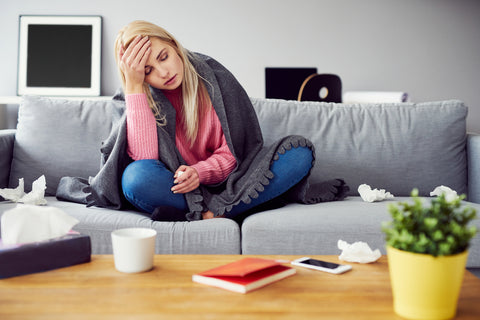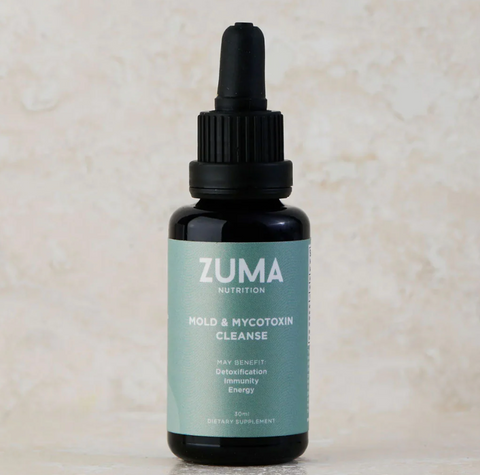Mycotoxin Exposure and Testing: A Guide to Health and Safety
February 28, 2024
Mycotoxins are potent toxins produced by certain molds that pose significant health risks to humans and animals. Given their serious potential health risks, there is a real need for greater public awareness and testing in cases of suspected mycotoxin exposure. In this article, we discuss the health implications of mycotoxin exposure, the importance of testing for individuals who suspect they've been exposed, and the methods and resources available for detecting these harmful compounds in the human body.
Understanding Mycotoxin Exposure

Mycotoxins can enter the human body through ingestion of contaminated food, inhalation of spores, or skin contact with moldy substances. (1) The health effects of exposure vary widely, depending on the type of mycotoxin, exposure level, and individual susceptibility. Acute symptoms can include:
- Nausea
- Vomiting
- Headaches
- Stomach pain
- Skin rash
- Allergic reactions
- Diarrhea
Long-term exposure may lead to more severe conditions such as immune suppression, liver and kidney damage, and increased risk of infections. Given the serious health risks associated with mycotoxins, it's vital for individuals who suspect they've been exposed to seek testing and appropriate medical intervention.
To learn more about the symptoms of mycotoxin exposure read our article "Symptoms of Mold Toxins."
The Role of Mycotoxin Testing in Health
Mycotoxin testing involves detecting the presence of these toxins in the body, which can help in diagnosing exposure and guiding treatment strategies. Testing is particularly important for individuals experiencing symptoms of mycotoxin exposure or those who have been in environments with high mold levels.
Types of Mycotoxin Tests for Humans

Several types of tests are available to detect mycotoxins in the body:
- Urine Tests: These are the most common form of mycotoxin testing for humans. Mycotoxins can be excreted in urine, making it a suitable sample for detecting exposure. (2)
- Blood Tests: Blood tests can detect the presence of mycotoxins or antibodies against molds, indicating exposure. (3)
- Tissue Biopsy: In severe cases, a tissue biopsy may be performed to determine the extent of organ damage caused by mycotoxins. (4)
Finding a Testing Facility
When seeking mycotoxin testing, it's crucial to find a reputable facility that specializes in environmental toxin exposure. Searching for "mycotoxin testing near me" can provide a list of local health facilities or laboratories equipped to perform these tests. Additionally, consulting with a healthcare provider who understands the complexities of mycotoxin exposure and testing is essential. They can recommend specific tests based on symptoms and exposure history.
FDA-Approved Testing and Resources
For accurate and reliable results, it's important to choose a testing facility that uses FDA-approved methods for mycotoxin detection. These facilities adhere to stringent quality control and testing standards, ensuring the validity of test results. The FDA and other health organizations may offer resources and guidance on selecting a testing facility.
Mycotoxin Testing Kits

For individuals interested in initial screening or ongoing monitoring, mycotoxin testing kits are available for home use. These kits typically consist of collecting a urine sample and sending the sample in to a laboratory for analysis. While convenient, it's important to note that home testing should not replace professional medical advice or testing. If a home test indicates mycotoxin exposure, seeking further evaluation from a healthcare professional is crucial.
The Importance of Professional Guidance
Understanding the results of mycotoxin tests and determining the appropriate course of action requires professional medical expertise. Your healthcare provider can interpret test results in the context of symptoms, exposure history, and individual health status to recommend treatment or preventive measures. Treatments may include detoxification protocols, dietary changes, and medications to alleviate symptoms or remove toxins from the body.
Prevention and Awareness
Preventing mycotoxin exposure is key to maintaining health and safety. This involves controlling mold growth in homes and workplaces, properly storing food to prevent mold contamination, and being aware of the signs of mycotoxin exposure. Education and awareness about the sources and risks of mycotoxins can empower individuals to take proactive steps to protect their health.
Mold & Mycotoxin Cleanse

Our Mold & Mycotoxin Cleanse tonic contains antifungal compounds and immune-supporting ingredients that may help to eliminate mold and mycotoxins in the body, especially when used as part of a holistic mold-detox protocol. However, it is important to work closely with a healthcare professional to test and treat mycotoxin exposure. If you suspect mycotoxin exposure, are experiencing symptoms, or are seeking treatment, speak with your doctor to determine if this supplement is right for you.
Summary
Mycotoxin exposure poses significant health risks, making testing an essential tool for those who suspect they have been exposed. With various testing methods and resources available, individuals have the means to confirm exposure and seek appropriate medical intervention. Professional guidance from healthcare providers is critical in interpreting test results and formulating a treatment plan. By prioritizing prevention, awareness, and testing, individuals can protect themselves and their families from the harmful effects of mycotoxins, ensuring a healthier, safer environment for all.
References
1 https://www.ncbi.nlm.nih.gov/pmc/articles/PMC164220/
2 https://www.ncbi.nlm.nih.gov/pmc/articles/PMC4584707/
True Health Starts with Feeding the Body


